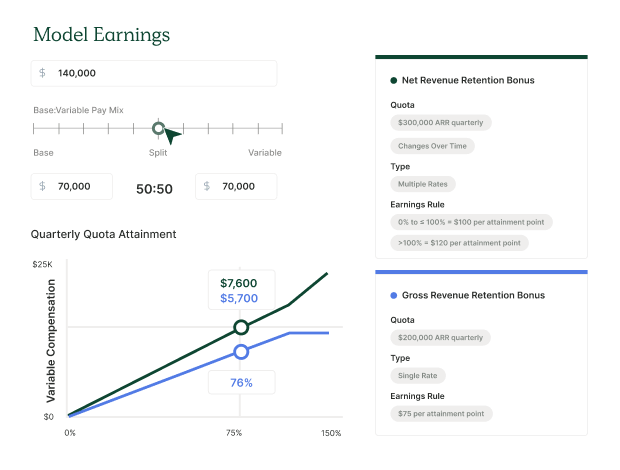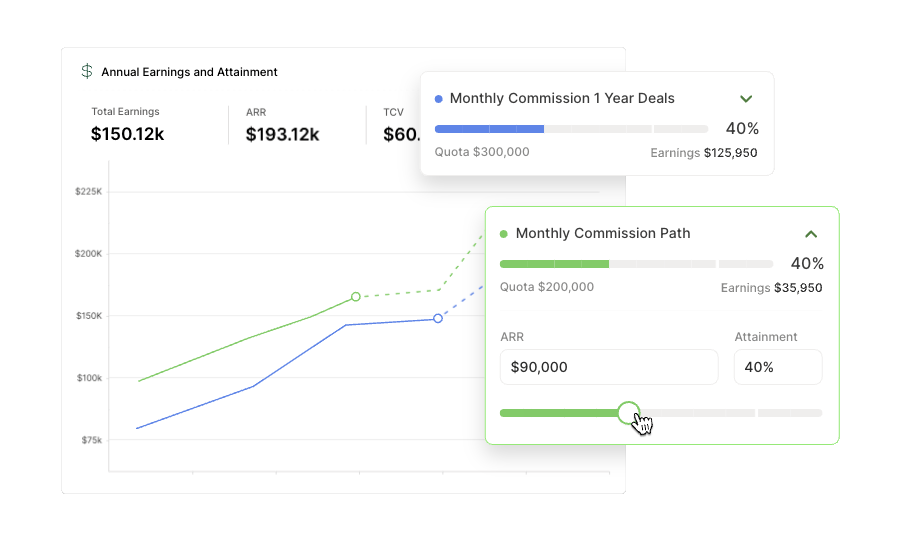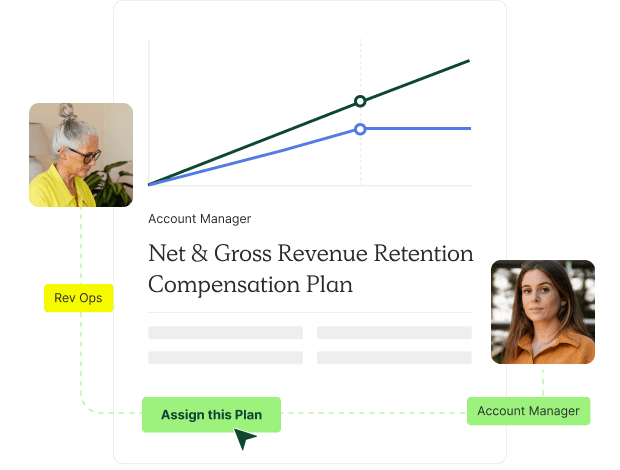- Most popular SaaS AM plan
- Companies within highly competitive industries
Gross & Net Revenue Retention
This AM comp plan is most appropriate for organizations who want the AM to budget their attention toward retention as well as upsells and expansion. Usually, we see structures that evenly split their variable component of GRR and NRR 50/50.

When to use this plan?
Why use a GRR & NRR plan?
Shows company values expansion as highly as retention and visa versa
Build the GRR & NRR Compensation Plan
Like this plan? Sign up for QuotaPath to build this plan and adjust the variables.
Forecast earnings & plan performance
See potential earnings based on your inputs and goal attainment progress.
Test plan proposals
Connect your sales source of truth to test previous sales cycle data against your drafted plan.
Streamline plan management
Assign the plan to your team and automate sales commission calculations. Be confident that your team is being paid fairly and accurately.



How to adjust this compensation plan
To customize this plan, input the following variables.
Pay Mix
Pay mix combines the base salary and on-target variable pay ratio. You might see 50/50, 60/40, or 70/30 pay mixes for account manager roles.
Company Revenue
Revenue is a company’s total income from its primary operations. In SaaS, annual recurring revenue is a crucial metric for many organizations.
Book of Business
This is the portfolio of assigned customers they are responsible for managing and growing. Some focus on the number of customers, while others measure the amount of revenue.
Quota
This will vary depending on the industry or company but will be based on a retention percentage that is often less than 100%.
Quota Period
For account managers, the most common quota period is quarterly, which is the time interval between the quota resetting.
What is the role of an account manager?
Account managers are responsible for building and maintaining relationships with clients. They work to understand the needs of their clients and ensure that those needs are met by the company they represent. They also serve as the primary point of contact between the client and the company.
What skills are required to be a successful account manager?
Successful account managers need strong communication and interpersonal skills, as well as the ability to build and maintain relationships with clients. They also need to be organized, detail-oriented, and able to manage multiple tasks simultaneously.
How are account managers communicate paid?
Account manager pay structures usually involve a base salary and variable compensation based on retention and upsell opportunities. The specific compensation structure may vary based on the company and industry.
What is the difference between an account manager and a sales representative?
Both roles involve working with clients. However, the primary focus of an account manager is on building and maintaining relationships, while a sales representative is focused on selling products or services.
How do account managers measure success?
Account managers may measure success based on metrics such as customer satisfaction, client retention rates, and revenue generated from existing clients.
Can companies have multiple account managers for the same client?
Yes, companies can have multiple account managers for the same client, particularly if the client has a large and complex account that requires multiple points of contact.
Could different account management teams have different compensation structures?
Yes, different account management teams within the same company may have different compensation structures based on factors such as the complexity of the accounts they manage, the industry they work in, and the level of experience and performance of individual team members.
Explore similar compensation plans
What industry leaders say
Manage compensation & track commissions with QuotaPath
Deliver visibility, automation, and seamlessness across the entire compensation process.

